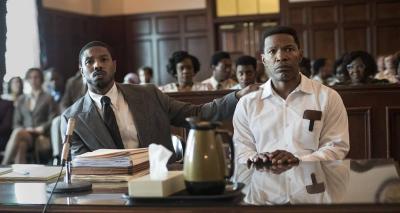Just Mercy (2019)

Photo from IMDb / © 2019 Warner Bros.
Michael B. Jordan as Bryan Stevenson (left) and Jamie Foxx as Walter "Johnny D" McMillian in "Just Mercy."
Rated PG-13 for thematic content including some racial epithets.
Visual Parables content ratings:
- Violence: 3/10
- Language: 1/10
- Sex & Nudity: 0/10
- Star Rating: 5 stars
“Just Mercy” follows defense attorney Bryan Stevenson (Michael B. Jordan) and his fight for justice in Alabama. A Harvard graduate, Stevenson goes to Alabama and works with Eva Ansley (Brie Larson), a local advocate, to defend people who have been wrongly convicted.
One of his first clients is Walter McMillian (Jamie Foxx), a Black man, who was sentenced to death for the murder of an 18-year-old white girl, despite a preponderance of evidence proving his innocence.
Stevenson faces multiple legal and political tactics and overt racism as he fights for McMillian, and others like him, with the system stacked against them.
Directed by Destin Daniel Cretton and co-written by Cretton, Andrew Lanham, and Bryan Stevenson (and based on Stevenson's memoir), this is a social justice film with heart and spirit that I wish everyone would see. It exposes in dramatic form just how racist the so-called judicial system of Alabama is.
After a short prelude in which we see student Bryan Stevenson easily bonding with an imprisoned black man, the story jumps ahead to the late 1980s when Stevenson has just graduated from Harvard and is visiting his mother before heading south to lead the Equal Justice Initiative, which was set up to defend Blacks sentenced to death. He is ably aided by a courageous white woman, Eva Ansley. Stevenson himself suffers humiliation upon his first visit to client Walter McMillian when the prison guard forces the lawyer to strip off all his clothes for a search before letting him into the secured area of the prison.
McMillian, Stevenson discovers, was put on death row as soon as he was arrested and accused of the brutal 1986 murder of 18-year-old Ronda Morrison in Monroeville, Alabama. Neither the police nor the District Attorney paid attention to the testimony of family and friends that Walter had been at a church fish fry when the murder was committed. His conviction rested entirely upon the testimony of the white Ralph Myers (Tim Blake Nelson), a convicted felon, whose testimony was coerced by the police.
Before he can probe deeper into the case, Stevenson must convince McMillian to reopen his case. The prisoner has been so beat down and disillusioned by the blatant racism of the system that he has given up hope, other lawyers having come and made promises they could not keep. Undeterred, Stevenson visits the McMillian family on their farm. After some hesitation McMillian’s wife, Minnie (Karan Kendrick), and her relatives are convinced that Stevenson is the real deal and agree that the case should be pursued. McMillian is persuaded to give his permission, especially after Stevenson informs him there will be no cost, and the lawyer proceeds.
It will, of course, be an uphill battle, beginning with the lawyer’s visit with both the local Sheriff and D.A. Tommy Chapman (Rafe Spall), who are upset by his activities. Stevenson is harassed by the local police, and an anonymous caller warns Eva that a bomb is about to go off at her house because she is lodging the lawyer there. Even when Stevenson gathers the overwhelming evidence that McMillian could not have committed the crime, he runs up against the embedded racism in the Alabama court system. It is interesting to note that the setting of the murder is Monroe County, where novelist Harper Lee’s Atticus Finch also defended a black man falsely accused of a crime he did not commit. The novel and film have brought so much fame to the town, that even the corrupt D.A. recommends that Stevenson should visit the local museum that honors them.
There are two deeply moving subplots involving two other prisoners in cells on either side of McMillian.
Herbert Richardson (Rob Morgan) is afflicted with PTSD and admits to his guilt, but the harrowing scene of his execution nonetheless underscores the inhumanity of the death sentence. Anthony Ray Hinton (O’Shea Jackson Jr.), however, is innocent, but will have to wait until his innocence can be proven.
Some have complained that Bryan Stevenson is portrayed too much as a saint, and his opponents as two-dimensional villains. It is true that a little more of Stevenson’s personal life and characteristics might have been included, but this is not a biographical film, it is one exploring the earliest case of a civil rights advocate with a 30-year career. A little more, too, of D.A. Tommy Chapman’s struggle with his conscience could have added complexity to his character. Indeed, the final outcome of the disposition of McMillian’s case is determined by what the guilt-ridden prosecutor does at the trial. This would have highlighted what Thoreau said in his famous essay on civil disobedience, that when one just man says “No,” tyranny falls, as well as Martin Luther King Jr.’s insistence upon appealing to the conscience of his opponents.
In the veritable army of civil rights heroes, the focus has usually been on the generals - Martin Luther King Jr., Ralph Abernathy, Medgar Evers - so it is good to learn of this 30-year veteran in the war for justice. We hear some of the advocate’s last words ring with a biblical note when he says, “We all need justice, we all need mercy, we all need unmerited grace.”
